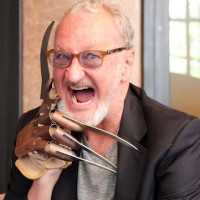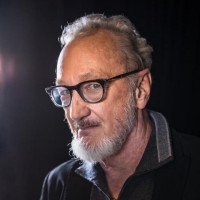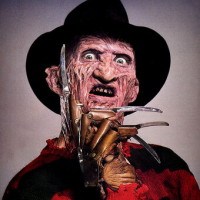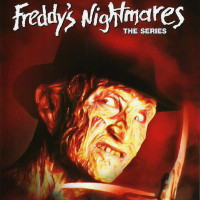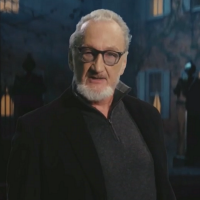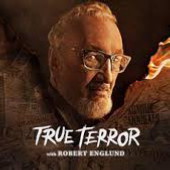Travel Channel's TRUE TERROR: Q&A Interview with Host Robert Englund + Episode Guide
Maj Canton - March 18, 2020
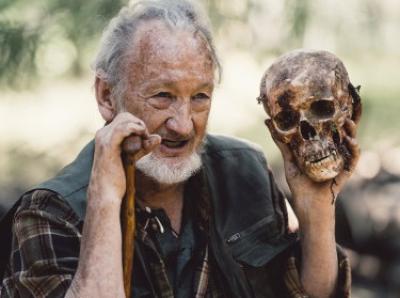
On Wednesday, March 18, 2020 at 10pm ET/PT, Travel Channel premieres the six-part, one-hour docudrama series, TRUE TERROR WITH ROBERT ENGLUND. Hidden away in the dark shadows of our nation's history are tales so terrifying, they must be true. Veteran actor and legendary horror movie icon Robert Englund (Freddy Krueger of the A NIGHTMARE ON ELM STREET franchise) scours news reports of yesteryear to bring viewers twisted tales ripped straight from the headlines. Using his ominous tones and creepy charisma, Englund weaves together a trilogy of spine-tingling tales, guided by newspaper accounts and layered with commentary from historians and experts that prove that truth is always stranger than fiction. From flying monsters to creatures in the night, to evil possessions and hauntings, these twisted tales will leave you wishing the stories really were only in their nightmares.
Q&A WITH 'TRUE TERROR' HOST ROBERT ENGLUND
On March 10, 2020 TV Tango participated in a press conference call with TRUE TERROR host Robert Englund. We edited the transcript for clarity and rearranged the order of some questions to improve readabiity
|
|
|
|
Question: What is TRUE TERROR and what drew you to the project? Robert Englund: I look at TRUE TERROR as comfort food from the dark side. It's equal parts TWILIGHT ZONE with some of the aspects of UNSOLVED MYSTERIES and then just a dash of DATELINE. It's something you can tune into and learn something dark from the underbelly of the American psyche. All of the stories began as journalism. That's what I think distinguishes it from two guys in a Louisiana swamp seeing a UFO. What drew me to it is the challenge of being an on host camera personality with all the baggage that I bring from horror movies and then blending that into the narration, which I'm also responsible for and trying to find at what point to make it conversational to the viewer and at what point to make it a little theatrical. |
|
Question: Are there any stories that are particularly compelling to you? Robert Englund: I knew that there had been a yellow fever and that there had been a smallpox epidemic and the influenza epidemic in America. But, in the New Orleans case, which I believe was smallpox; I had no idea that there was some scam between coroners and the guys that drove the charity wagons to the cemetery, coffin makers, and the gravedigger. People were literally being buried alive for profit. And this is as recently as late last century. We all have things in American history that go over our head or astounding facts of nature that we've missed somehow. I think what's great about True Terror is that we have a lot of stories you haven't heard of. They began as a newspaper article and now they're the stuff of urban legends. These are very site specific, and that really intrigued me. I've come to understand that the Sasquatch was part of aboriginal and Native American folklore and that there is some kind of historical cred to it. Not only was it published in newspapers but we actually have a president of the United States, Theodore Roosevelt, as one of our sources. That kind of stuff is really intriguing to me. Question: What kind of story do you find the most challenging to narrate? Robert Englund: The challenge for me is the blending from my on screen talking and my recaps and my introductions and then into the images of the reenactments because I haven't always seen those. You want to keep the energy blendable. It's that choice of when to be conversational and when to be extra dark. That's the real challenge for me. I don't really distinguish between the content. I will say that if it's a ghost story or if it's something particularly dark, a serial killer or something, I tend to embrace the theatrical more on that. If it's more historical and "what if," I'm a little more "What do you think, viewer? What do you think, Mr. and Mrs. Audience? What do you think about this?" Question: How much did journalism play into the research of these stories? Robert Englund: Most of these stories are 19th century, some in the early 20th centuries. As a journalist, you understand the difference between journalism and tabloid. And yet, tabloid has always been part of journalism, as have the human-interest stories. Science has matured and changed and a lot of this can be discounted by science. The other thing is that we were a much more superstitious country in the 19th century. The idea that these were reported and taken seriously--what I love about that--it explains something to us about who we were, about the American psyche, the American predilection for that kind of story. And I like that. I think that's interesting. I think it separates True Terror from two rednecks in a swamp in Louisiana seeing a UFO. Some of these stories on True Terror have become urban legends. But, they began as something that was reported in a newspaper at one time. And when you look at their stories maybe there is just a smidge of credibility there. |
|
|
|
|
|
Question: Do you go on location to shoot the episodes? Robert Englund: I know reenactments on reality TV can be good, or a little cheesy. The production team found this great area all around Richmond, Virginia and I think even into Maryland a bit. It's just full of American history and the people there are very proud about that. Lots of historical buildings and old churches and old barns are preserved. They did a really good job. They found people who have faces that lend themselves to period reenactment. And I was really pleased when I first started seeing some of the film coming in from the location. I haven't been on location yet with them. I'm hoping they'll bring me and we can do that old trick that they used to do in the later seasons of Twilight Zone. An episode would end, and you'd be looking at a telltale prop from the episode and then the camera would pan over away and there would be Rod Serling leaning up against the wall. And he would do the wrap up. And I'm hoping maybe they can bring me out to do that once in a while. |
|
Question: Do you have any legends on your wishlist for next season? Robert Englund: This is my favorite question so far. Right after I finished my last narration duties my sister in law left a book at my place. It was called The Devil in the White City, and it's about the 1893 Chicago exposition World's Fair, the Columbian Exposition, and simultaneously America's first serial killer [H.H. Holmes] who exploited the growth of the fair and the growth in the population in Chicago and the country girls coming to town for the fair. There's some estimates that he may have killed up to 200 people. I'm reading this book and it's just phenomenal. And it's all public domain. It's part of history. I just can't wait to get together with my producers again when we get ready for the next season and tell them about this book because I think there's so many interesting stories to mine from it that we could get at least one episode of three segments, if not more, out of that. I'd also like us to look into a little bit more of Native American folklore. Question: Have you had any supernatural experiences of your own? Robert Englund: I've had a couple of really strong de ja vu experiences. They've all been in rooms. They've all been about rooms. I've walked into rooms that I've dreamed of before I entered them. And it's happened a couple of times, which is really strange. I'm looking up at a painting on the wall and I've seen that painting in a dream. I don't really have a ghost story. But, I have been in rooms where terrible things have occurred. And I think there's something to the idea of contained energy from someone who suffered perhaps or a group of people that suffered in one place. |
|
|
|
|
|
Question: How do you feel that Freddy Krueger has made it into urban legend in America? Robert Englund: Freddy's an amalgamation of Wes Craven's experiences. I think that there was a bully in his school named Fred Krueger. I think when Wes chose the name for his bogeyman, he liked a Germanic aspect. The other part is that there was a point in time when Johnny Carson was doing Freddy Krueger jokes and Freddy Krueger was on the cover of MAD Magazine and Freddy Krueger was in the Sunday comics in some of the more bizarre strips. And he was the subject of just about hundreds of rap lyrics in the nineties and the early 2000s. He's just part of the American vernacular. And I think that's where it gets confusing for some people, especially a younger generation comes along, and they see an old DVD lying around or they watch it on a Halloween. And they think that maybe it was based on something true like Ted Bundy. The whole concept of NIGHTMARE ON ELM STREET is very symbolic. I think it's a loss of innocence in America. Freddy has the line, "Every town has an Elm Street." Well, every town also has a Broadway and a Main Street and an Oak Street. But, Elm Street's also the street that JFK was assassinated on in Dallas. That's the beginning of our loss of innocence and our distrust of government and our group American paranoia. I think it's an amalgamation of all of those things. |
|
|
|
|
Question: You used to host FREDDY'S NIGHTMARES as Freddy Krueger. Did that show help inform your work on TRUE TERROR? Robert Englund: No. I go to a lot of film festivals and I'm often asked to speak. The fans are there so I work it a little bit. I've been in the theater and I work that aspect of my personality. I took a little bit of that and a little bit of my Vincent Price persona, a little bit of Klaus Kinski, a little bit of Rod Serling, a little bit of Unsolved Mysteries. It's not a lot. It's still me. I'm also trying to just live up to the expectation that a lot of fans have of what I might really be like. So, it is TRUE TERROR WITH ROBERT ENGLUND. It's not TRUE TERROR with Robert Englund pretending to be somebody else. |
|
|
|
|
Question: Is there still a bucket list item, a dream career goal you are hoping for? Robert Englund: What happens is you have these certain parts you want to play. I did a film with Finn Jones from GAME OF THRONES. And it's some of the best work I've ever done. This is a part I would never have thought of - playing an English projectionist at a suburban mall. But it's one of my favorite roles. I got to understudy the role of Iago at Great Lakes Shakespeare Festival. I had to sit backstage every night in case the guy playing Iago got hurt because that's the role I wanted to do. And then, I could have probably played Iago until I was 60. I used to use it for my auditions in the theater, and every time I auditioned with that part, I got the part. So, that's a bit of a disappointment that I never got to play that one. What actors always say, "my favorite role is the next one I do," because you never know when that's going to be something as fulfilling. And I never would have guessed in a million years that the little movie would have been a challenge and that I would have been proud of that role. But, I am. |
|
|
EPISODE GUIDE
"Twisted Relationship" (Premieres Wednesday, March 18, 2020 at 10pm ET/PT): A North Carolina storekeeper who is tormented by a prophetic countdown to his doom. Did he will his own fate or was there a higher power at play? Then, a New Orleans teenager finds himself literally trapped inside a waking nightmare, unable to save himself from his horrific fate. Finally, an Atlanta police station becomes a battleground for a killer … and a vengeful spirit. Other stories this season include: a mechanical marvel that torments its owner; a shadowy serial killer known as "The Axeman" authors a letter that ignites panic; a farmer battles a devilish curse; a greedy undertaker defiles the dead – then faces their wrath; a future president enters a savage beast's den; a family is stalked by a mythical creature and many more haunting stories you have to see to believe. |

